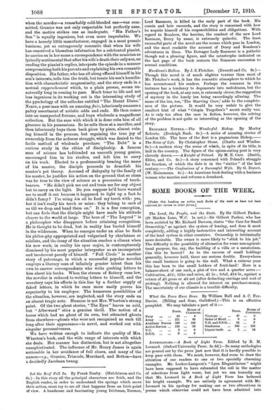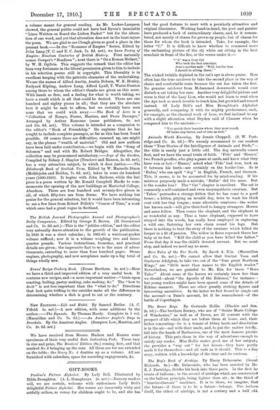ArrrnoLocass.—A Book of Light Verse. Edited by R. M. Leonard.
(Oxford University Press. as. 6d.)—So many anthologies are poured out by the press just now that it is hardly possible to keep pace with them. We must, however, find room to draw the attention of our readers to one or two specially charming examples. Mr. Locker-Lampson's "Lyra Elegantiarum " might have been supposed to have exhausted the soil in the matter • of selections from light verse, but yet we can honestly say that Mr. Leonard in A Book of Light Verse has bettered his bright example. We are entirely in agreement with Mr. Leonard in his apology for making one or two alterations in poems which otherwise could not have been admitted into a volume meant for general reading. As Mr. Locker-Larapson showed, the general public could not have had Byron's inimitable "Lines Written on Board the Lisbon Packet" but for the altera- tion of one word, and yet that alteration does not in the least injure the poem. We are glad to see Clough given so good a place in the present book.—In the "Romance of Empire" Series, Edited by John Lang (T. C. and E. C. Jack, 7s. 6d. net), we have Poetry of Empire: Nineteen Centuries of British History. First naturally comes Cowper's " Boadicea " ; next there is "On a Roman Helmet," by W. H. Ogilvie. This suggests the remark that the editor has been very fortunate in the liberal permission given to him to include in his selection poems still in copyright. This liberality is in excellent keeping with the patriotic character of the undertaking. We see the names of Alfred Austin, Austin Dobson, W. E. Henley, Rudyard Kipling, Andrew Lang, Alfred Lyall, T. Watts-Dunton among those to whom the editor's thanks are given on this score. With hands so free, and a feeling for what is worth taking, we have a result which is all that could be desired. There are one hundred and eighty pieces in all ; that they are the absolute best it might be rash to affirm, but we certainly have seen none that we could wish away.—The Book of Love is a "Collection of Essays, Poems, Maxims, and Prose Passages," Arranged by Arthur Ransome (same publishers, 6s. net and 10s. 6d. net). This volume is intended as a companion to the editor's "Book of Friendship." He explains that he has sought to include complete passages, as far as this has been found possible. Of course there are difficulties, summed up, one might say, in the phrase "wealth of material." Old and new authors have been laid under contribution,—we begin with the "Song of Solomon" and end with Mr. Robert Bridges. Altogether, the collection may be pronounced satisfactory.—Joys of the Garden, Compiled by Sidney J. Shaylor (Truslove and Hanson, 2s. 6d. net), has a very attractive subject, to which it does justice.—The Edinburgh Book of Scottish Verse, Edited by W. Macneile Dixon (Meiklejohn and Holden, 7s. 6d. net), takes in some six hundred years (1300-1910). It begins with John Barbour, while the last piece is a poem written by Mr. Ronald Campbell Macfie to com- memorate the opening of the new buildings at Marischal College, Aberdeen. There are four hundred and seventy-five pieces in all, of which fifty-two are from Burns. We have nothing but praise for the general selection, but it would have been interesting to see a few lines from Robert Pollok's "Course of Time," a work which once had a great vogue in Scotland.























































 Previous page
Previous page